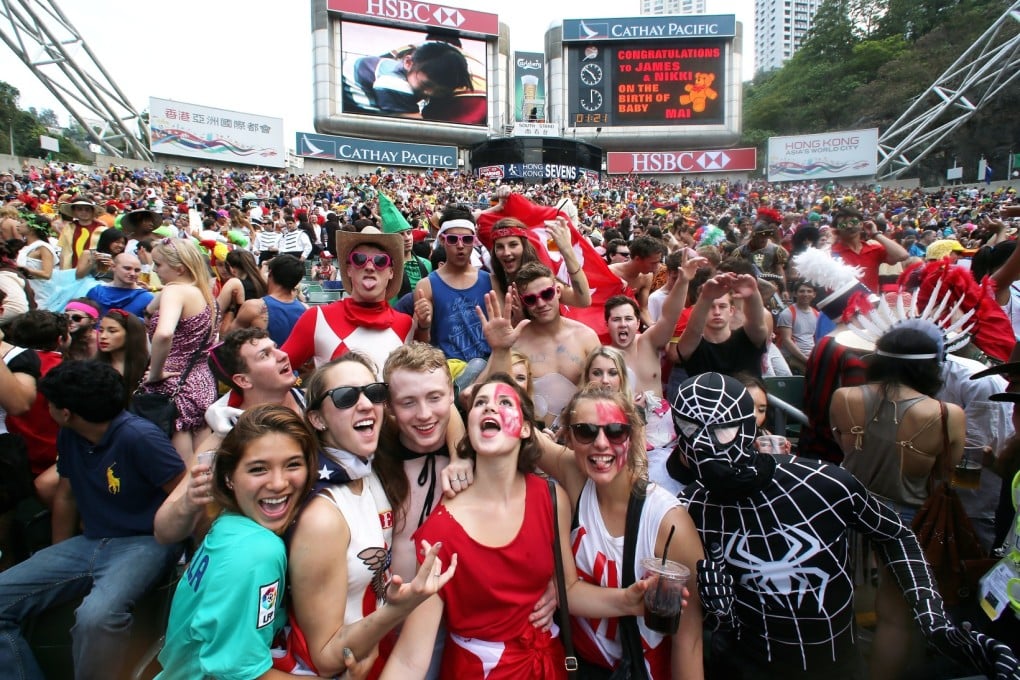Opinion | Someone else's party
Unlike the Standard Chartered Marathon or the Stanley Dragon Boat Championships – both of which draw large local crowds – the Sevens is irrelevant to most of the city’s population and receives little to no coverage from the Chinese press.

Late March in Hong Kong brings clammy air, frequent drizzles and the gradual return of subtropical heat. It is also marked by a spike in beer consumption and hotel room rates, caused not by the arrival of spring but a spectacle known as the Hong Kong Sevens. The three-day rugby tournament is much more than just an international sporting event; to every expatriate living in Hong Kong, it is a celebration bigger than Christmas and New Year. It is a cross between the Super Bowl, Halloween and Oktoberfest. It is Mardi Gras without the parade and Spring Break with bam bam sticks. The annual carnival fills the Hong Kong Stadium with cheers, beer breath and spontaneous eruptions of song and dance.
Rugby sevens involves fewer players than regular rugby. Each game consists merely of two seven-minute halves. Think of it as beach volleyball or five-a-side soccer. To prove that size doesn’t matter, rugby sevens will make its Olympic debut at the 2016 Summer Games in Rio de Janeiro.
The first Hong Kong Sevens tournament was held in 1976. The sport was introduced to the then British colony by a handful of rugby-loving English businessmen. The securing of Cathay Pacific as a corporate sponsor ensured the event's survival in an otherwise unathletic city. Indeed, the lack of local participation has always been a public relations issue for the Sevens. There wasn’t a single ethnic Chinese on the local team until Fuk-Ping Chan became the first Hong Kong-born player to represent the city in 1997. Even today, the "Hong Kong Dragons" look more like the starting lineup of Manchester United than their parochial team name would suggest.
Rugby is a decidedly English pastime. The sport is dominated by Commonwealth nations around the world. England and ex-British colonies like Australia, New Zealand, Fiji and Samoa are favourites at the Hong Kong Sevens, which is why thousands of Brits, Aussies and Kiwis living in Hong Kong flock to the games every year. Over time, the Sevens became the single biggest event on their social calendar. It didn’t take long before Americans and expats from other non-rugby-playing countries took notice. Rugby fans or not, they jumped on the bandwagon and turned the event into a pan-Caucasian extravaganza.
During the Sevens weekend, expats and tourists swamp the Hong Kong Stadium and overrun restaurants and bars. The normally quiet Caroline Hill Road in Causeway Bay – the only entry point to the stadium – is packed like a Chinese New Year flower market. Streets are cordoned off for crowd control and scalpers are everywhere. Unhired taxis become the hottest commodity in town. The south stand of the stadium is where the rowdiest crowds congregate and minors are denied entry for safety reasons, which also makes it the most exciting place to be in Hong Kong.
Despite all the hullabaloo, the Hong Kong Sevens is a non-event among the locals. Unlike the Standard Chartered Marathon or the Stanley Dragon Boat Championships – both of which draw large local crowds – the Sevens is irrelevant to most of the city’s population and receives little to no coverage from the Chinese press. If it weren’t for the backed-up traffic in Causeway Bay during that weekend, most locals wouldn’t even know that there was a tournament going on. For three days in March, the Hong Kong Stadium is a sea of gweilos holding a beer in one hand and a hot dog in another. If you look hard enough, you may spot the occasional local Hongkonger trying to blend in. It is as odd as going to the French Open and finding the Roland Garros Stadium full of Chinese faces.
